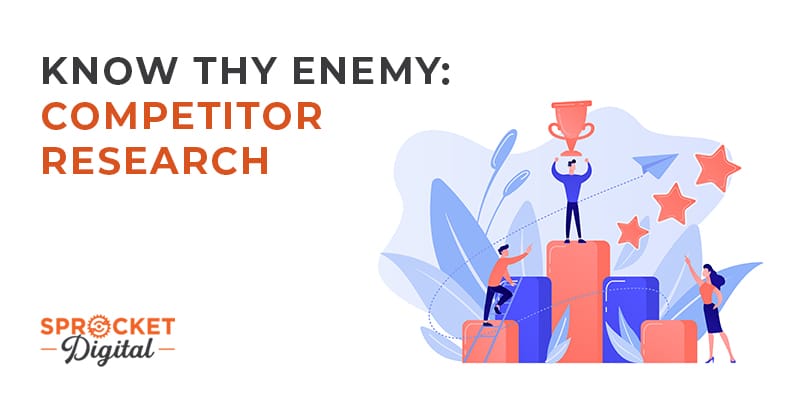“Know Thy Enemy”
What you can learn from competitor analysis
In The Art of War, Sun Tzu wrote “Know thyself, know thy enemy”. In the art of business, the same rule applies: getting to know your competition is not only advantageous for growth, it’s a necessity.
Competitor research is a key part of confirming a business’ viability, setting benchmarks and standards, and figuring out how to position yourself in the market.
It’s the process of finding out who your competitors are, what products/services they offer, how they promote themselves, and where there are gaps to be exploited.
Competitor analysis can provide a wealth of information to improve the effectiveness of your business’ marketing. In this article, learn why this information is so valuable and how you can use it to grow your business.
Why is it important to research your competitors?
Competitor research is valuable for new, growing, and established businesses as the competitive landscape is constantly shifting.
Only looking internally can put you at risk of missing opportunities, failing to keep up with the pace of market developments, and plateauing as your competitors succeed.
Imagine if an Olympic athlete only compared themself to their personal best, rather than the international record. They might still race well, but without knowing the speeds of the other athletes or their strengths and weaknesses, they won’t be well placed to compete.
Here are three practical ways that competitor research can help to grow your business:
- Identify the benchmarks and standards of your industry
The bar for product quality, marketing, and customer service varies in height from industry to industry. Discovering where this benchmark is set lets you know where to aim for, and where you can exceed those standards with your business.
For example, in a service industry with a low benchmark for customer service, your business could aim to exceed those expectations and thereby win over customers. Or, in an industry with a high bar for quality products, you’ll know that you have to work harder to ensure your own quality is up to scratch, in order to compete.
Knowing what level your competitors are playing at lets you measure your own growth against them and also know where and how you can outperform industry standards.
- Identify gaps and opportunities in the market
Let’s say you want to sell books. There are hundreds of other booksellers out there, and several multinationals with giant marketing budgets to compete with. But through competitor analysis, you can see there’s a gap for fantasy book fans who struggle to find their favourite niche titles in the major stores.
You’ve just discovered a gap in the market – a blind spot in your competitors’ strategy – and the first step to developing a viable business.
Finding these gaps or opportunities can show you where there is space for your own business to expand or diversify, as well as what areas are already oversaturated. This can help to focus your business’ direction and find audiences that are being underserved.
- Identify what makes you different
To create a compelling proposition, a business needs to know what makes it different or better than its competitors. With hundreds of businesses flooding online, it’s more important than ever to define your differentiators and demonstrate why customers should buy from you and not anyone else.
Google customer research shows us that the majority of consumers do their research online before buying – when they’re looking at a dozen different brands offering similar products, what will make yours stand out?
Awareness of what your competitors are offering, how their business promotes itself, and their weak spots allows you to confidently market your own product or service based on clear differentiators that your customer wants to see.
What does competitor analysis look like?
There are several ways to approach competitor research and analysis, and it’s not just something to do once when you’re starting out – we recommend doing a regular check to maintain awareness across the market as your competitors change and grow.
If you’re not sure where to start, ask your digital marketing agency for support.
- Determine who your competitors are
Who are you going to be measuring yourself against? Look for not only big players in your industry, but also smaller businesses that may be more specialised in one or two of the products/services you sell.
- Determine what products or services they offer
What do each of these competitors offer? How does their range compare to yours, what complementary products or services do they provide, and how do they bundle them together?
- Look at their offers, sales, perks and prices
How are they encouraging customers to close the deal? Look at their sales, prices, and sweeteners like free shipping, bulk discounts, bonus products, or return policies.
- Look at their marketing
How do they position and differentiate themselves? Take a look through their social media accounts and blogs to see what they say about their products and how (and how their customers respond). Use an SEO tool or expert to see what keywords they’re performing well for, and which ones are absent.
- Look at their reviews
How do their customers talk about them? Google reviews can reveal a lot, from what customers wish they did better, to positive interactions that turned the customer into a fan.
- What are they missing?
Is there a product they’re not selling, a topic they’re not talking about, an audience they’re ignoring, or a keyword they’re neglecting? Look into their blind spots and weaknesses to uncover opportunities for your business.
It’s important to remember while conducting competitor research that you’re not doing this to mimic or copy ideas – you’re not trying to beat them by becoming like them. You’re trying to uncover gaps, opportunities, and areas where you can exceed expectations to set yourself apart for being yourself.
New, growing, and established businesses alike can develop more effectively by knowing what’s around them in the market and how their products are competing.
At Sprocket Digital, we help businesses to conduct competitor analysis as part of our digital marketing strategies. We know what to look for and where, to help your business get ahead of the competition.




